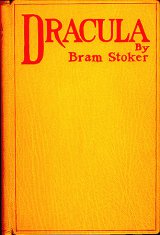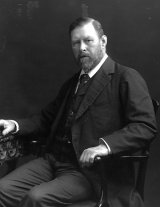Dracula Page #14
Dracula is an 1897 Gothic horror novel by Irish author Bram Stoker. It introduced Count Dracula, and established many conventions of subsequent vampire fantasy. The novel tells the story of Dracula's attempt to move from Transylvania to England so that he may find new blood and spread the undead curse, and of the battle between Dracula and a small group of men and a woman led by Professor Abraham Van Helsing.
* * * * * 19 May.--I am surely in the toils. Last night the Count asked me in the suavest tones to write three letters, one saying that my work here was nearly done, and that I should start for home within a few days, another that I was starting on the next morning from the time of the letter, and the third that I had left the castle and arrived at Bistritz. I would fain have rebelled, but felt that in the present state of things it would be madness to quarrel openly with the Count whilst I am so absolutely in his power; and to refuse would be to excite his suspicion and to arouse his anger. He knows that I know too much, and that I must not live, lest I be dangerous to him; my only chance is to prolong my opportunities. Something may occur which will give me a chance to escape. I saw in his eyes something of that gathering wrath which was manifest when he hurled that fair woman from him. He explained to me that posts were few and uncertain, and that my writing now would ensure ease of mind to my friends; and he assured me with so much impressiveness that he would countermand the later letters, which would be held over at Bistritz until due time in case chance would admit of my prolonging my stay, that to oppose him would have been to create new suspicion. I therefore pretended to fall in with his views, and asked him what dates I should put on the letters. He calculated a minute, and then said:-- "The first should be June 12, the second June 19, and the third June 29." I know now the span of my life. God help me! * * * * * 28 May.--There is a chance of escape, or at any rate of being able to send word home. A band of Szgany have come to the castle, and are encamped in the courtyard. These Szgany are gipsies; I have notes of them in my book. They are peculiar to this part of the world, though allied to the ordinary gipsies all the world over. There are thousands of them in Hungary and Transylvania, who are almost outside all law. They attach themselves as a rule to some great noble or boyar, and call themselves by his name. They are fearless and without religion, save superstition, and they talk only their own varieties of the Romany tongue. I shall write some letters home, and shall try to get them to have them posted. I have already spoken them through my window to begin acquaintanceship. They took their hats off and made obeisance and many signs, which, however, I could not understand any more than I could their spoken language.... * * * * * I have written the letters. Mina's is in shorthand, and I simply ask Mr. Hawkins to communicate with her. To her I have explained my situation, but without the horrors which I may only surmise. It would shock and frighten her to death were I to expose my heart to her. Should the letters not carry, then the Count shall not yet know my secret or the extent of my knowledge.... * * * * * I have given the letters; I threw them through the bars of my window with a gold piece, and made what signs I could to have them posted. The man who took them pressed them to his heart and bowed, and then put them in his cap. I could do no more. I stole back to the study, and began to read. As the Count did not come in, I have written here.... * * * * * The Count has come. He sat down beside me, and said in his smoothest voice as he opened two letters:-- "The Szgany has given me these, of which, though I know not whence they come, I shall, of course, take care. See!"--he must have looked at it--"one is from you, and to my friend Peter Hawkins; the other"--here he caught sight of the strange symbols as he opened the envelope, and the dark look came into his face, and his eyes blazed wickedly--"the other is a vile thing, an outrage upon friendship and hospitality! It is not signed. Well! so it cannot matter to us." And he calmly held letter and envelope in the flame of the lamp till they were consumed. Then he went on:-- "The letter to Hawkins--that I shall, of course, send on, since it is yours. Your letters are sacred to me. Your pardon, my friend, that unknowingly I did break the seal. Will you not cover it again?" He held out the letter to me, and with a courteous bow handed me a clean envelope. I could only redirect it and hand it to him in silence. When he went out of the room I could hear the key turn softly. A minute later I went over and tried it, and the door was locked. When, an hour or two after, the Count came quietly into the room, his coming awakened me, for I had gone to sleep on the sofa. He was very courteous and very cheery in his manner, and seeing that I had been sleeping, he said:-- "So, my friend, you are tired? Get to bed. There is the surest rest. I may not have the pleasure to talk to-night, since there are many labours to me; but you will sleep, I pray." I passed to my room and went to bed, and, strange to say, slept without dreaming. Despair has its own calms. * * * * * 31 May.--This morning when I woke I thought I would provide myself with some paper and envelopes from my bag and keep them in my pocket, so that I might write in case I should get an opportunity, but again a surprise, again a shock! Every scrap of paper was gone, and with it all my notes, my memoranda, relating to railways and travel, my letter of credit, in fact all that might be useful to me were I once outside the castle. I sat and pondered awhile, and then some thought occurred to me, and I made search of my portmanteau and in the wardrobe where I had placed my clothes. The suit in which I had travelled was gone, and also my overcoat and rug; I could find no trace of them anywhere. This looked like some new scheme of villainy.... * * * * * 17 June.--This morning, as I was sitting on the edge of my bed cudgelling my brains, I heard without a cracking of whips and pounding and scraping of horses' feet up the rocky path beyond the courtyard. With joy I hurried to the window, and saw drive into the yard two great leiter-wagons, each drawn by eight sturdy horses, and at the head of each pair a Slovak, with his wide hat, great nail-studded belt, dirty sheepskin, and high boots. They had also their long staves in hand. I ran to the door, intending to descend and try and join them through the main hall, as I thought that way might be opened for them. Again a shock: my door was fastened on the outside. Then I ran to the window and cried to them. They looked up at me stupidly and pointed, but just then the "hetman" of the Szgany came out, and seeing them pointing to my window, said something, at which they laughed. Henceforth no effort of mine, no piteous cry or agonised entreaty, would make them even look at me. They resolutely turned away. The leiter-wagons contained great, square boxes, with handles of thick rope; these were evidently empty by the ease with which the Slovaks handled them, and by their resonance as they were roughly moved. When they were all unloaded and packed in a great heap in one corner of the yard, the Slovaks were given some money by the Szgany, and spitting on it for luck, lazily went each to his horse's head. Shortly afterwards, I heard the cracking of their whips die away in the distance.
Translation
Translate and read this book in other languages:
Select another language:
- - Select -
- 简体中文 (Chinese - Simplified)
- 繁體中文 (Chinese - Traditional)
- Español (Spanish)
- Esperanto (Esperanto)
- 日本語 (Japanese)
- Português (Portuguese)
- Deutsch (German)
- العربية (Arabic)
- Français (French)
- Русский (Russian)
- ಕನ್ನಡ (Kannada)
- 한국어 (Korean)
- עברית (Hebrew)
- Gaeilge (Irish)
- Українська (Ukrainian)
- اردو (Urdu)
- Magyar (Hungarian)
- मानक हिन्दी (Hindi)
- Indonesia (Indonesian)
- Italiano (Italian)
- தமிழ் (Tamil)
- Türkçe (Turkish)
- తెలుగు (Telugu)
- ภาษาไทย (Thai)
- Tiếng Việt (Vietnamese)
- Čeština (Czech)
- Polski (Polish)
- Bahasa Indonesia (Indonesian)
- Românește (Romanian)
- Nederlands (Dutch)
- Ελληνικά (Greek)
- Latinum (Latin)
- Svenska (Swedish)
- Dansk (Danish)
- Suomi (Finnish)
- فارسی (Persian)
- ייִדיש (Yiddish)
- հայերեն (Armenian)
- Norsk (Norwegian)
- English (English)
Citation
Use the citation below to add this book to your bibliography:
Style:MLAChicagoAPA
"Dracula Books." Literature.com. STANDS4 LLC, 2024. Web. 24 Nov. 2024. <https://www.literature.com/book/dracula_10>.




Discuss this Dracula book with the community:
Report Comment
We're doing our best to make sure our content is useful, accurate and safe.
If by any chance you spot an inappropriate comment while navigating through our website please use this form to let us know, and we'll take care of it shortly.
Attachment
You need to be logged in to favorite.
Log In